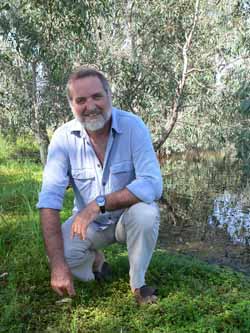 A major global report co-authored by a leading Charles Sturt University (CSU) academic highlights healthy ecosystems as the basis for sustainable water resources and stable food security for people around the world, including Australia.
A major global report co-authored by a leading Charles Sturt University (CSU) academic highlights healthy ecosystems as the basis for sustainable water resources and stable food security for people around the world, including Australia.Director of CSU’s Institute for Land, Water and Society (ILWS), Professor Max Finlayson, explained that healthy ecosystems help produce more food per hectare of agricultural land, are more resilient to climate change and produce more economic benefits for poor communities.
The report, An Ecosystems Approach to Water and Food Security, was released today, Tuesday 23 August (Australian time), in Sweden by the United Nations Environment Programme, the International Water Management Institute and 19 collaborating institutions, including ILWS.
“How we manage and invest in the connections between ecosystems, water and food could help us avoid water scarcity and meet the growing food demands of a global population tipped to reach nine billion by 2050,” Professor Finlayson said.
“Diversifying our crops, planting trees on farms and improving rainwater collection are important practical steps we can take to improve these connections.”
The report, which has been released during World Water Week, points out that policymakers should consider farmland, fisheries and other agricultural areas as ‘agroecosystems’ that provide sources for food and services such as purifying water and regulating floods.
“The degradation of these other services has already caused the loss of soil nutrients and an increase of soil salinity, which in turn has decreased food production in many major cropping areas, including the Murray Darling Basin in Australia. This decline may also be exacerbated by climate change,” Professor Finlayson said.
One major challenge to increasing food production is access to sufficient water for livestock, irrigation and fisheries, as well as domestic and industrial uses.
“Groundwater reserves are already in decline in such major ‘breadbaskets’ as the North China plains, the Indian Punjab and western USA. Maintaining healthy, resilient ecosystems to ensure water is available for agriculture and other ecosystem services is essential for long-term food security,” he said.





Social
Explore the world of social